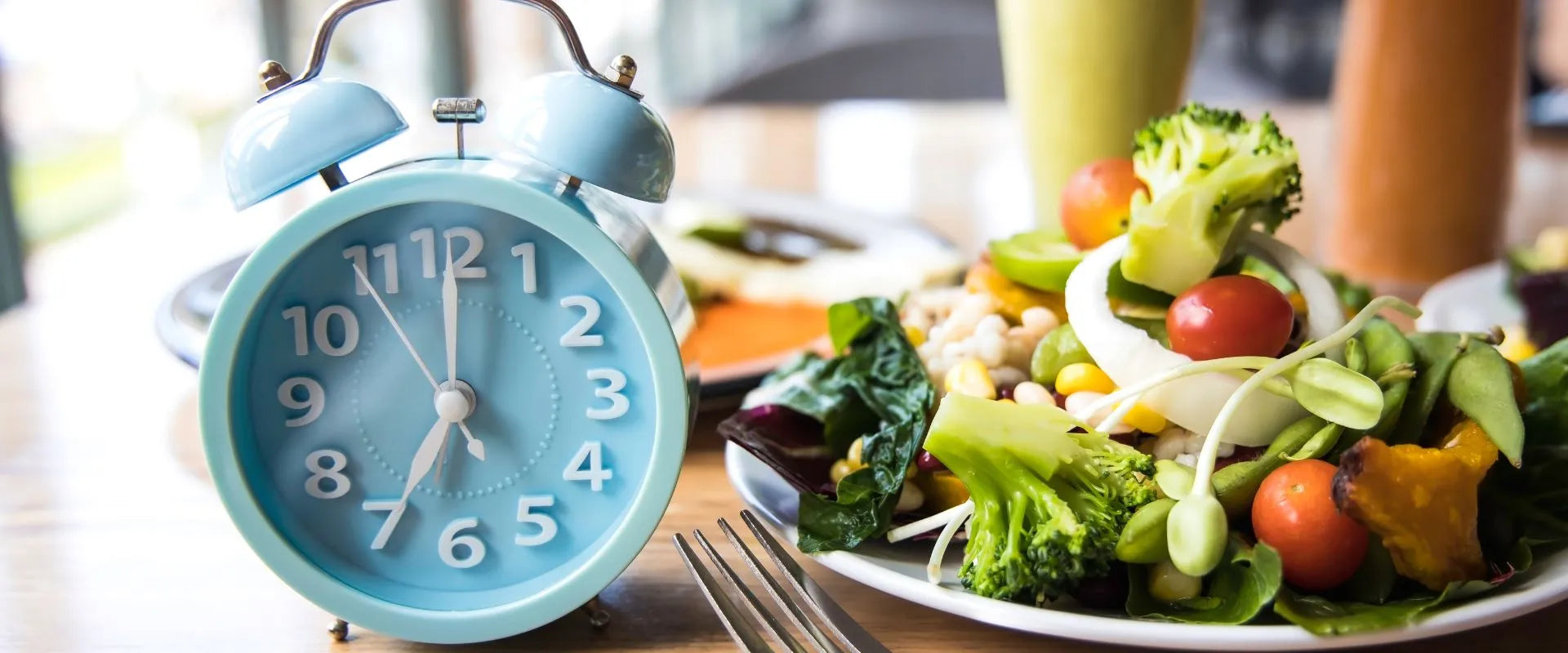Stress and sleep are deeply connected - poor sleep increases stress, and stress disrupts sleep. But you can break this cycle with simple sleep hygiene habits. Here’s a quick overview of the 10 best tips to improve your sleep and recover from stress:
- Stick to a Sleep Schedule: Go to bed and wake up at the same time daily, even on weekends. Aim for 7-9 hours of sleep.
- Create a Bedtime Routine: Relax with calming activities like reading, journaling, or meditation before bed.
- Make Your Bedroom Sleep-Friendly: Keep it cool (60–68°F), dark, and quiet. Use breathable bedding and blackout curtains.
- Limit Screen Time: Avoid screens 1–2 hours before bed to reduce blue light’s impact on melatonin production.
- Practice Relaxation Techniques: Try deep breathing, progressive muscle relaxation, or meditation to calm your mind.
- Time Exercise Wisely: Avoid intense workouts 3 hours before bed; opt for light yoga or stretching instead.
- Watch Food and Drink Timing: Avoid heavy meals, caffeine (8 hours before bed), and alcohol close to bedtime.
- Nap Smartly: Keep naps short (20–30 minutes) and avoid napping after 3 PM.
- Address Sleep Problems: Seek professional help for chronic sleep issues like insomnia or sleep apnea.
- Write Down Worries: Journaling your thoughts or to-do lists can help clear your mind and improve sleep.
Start small - pick one or two habits to implement today. Better sleep leads to lower stress, improved recovery, and a healthier, more energized you.
1. Keep Regular Sleep Hours
Sticking to a consistent sleep schedule can greatly improve how well you sleep and help lower stress levels. A regular schedule helps strengthen your circadian rhythm, making it easier to fall asleep and wake up feeling refreshed. Adults who sleep fewer than eight hours report higher stress levels - 5.5 out of 10 - compared to 4.4 for those who get enough rest [1].
"It's best to get at least seven hours of sleep each night and to go to bed and wake up at about the same time every day." - American Heart Association
"High levels of stress impair sleep by prolonging how long it takes to fall asleep and fragmenting sleep. Sleep loss triggers our body's stress response system, leading to an elevation in stress hormones, namely cortisol, which further disrupts sleep."
Here’s how to establish a solid routine:
- Set consistent sleep and wake times: Try to stick to the same schedule every day, even on weekends. If needed, keep variations within 1-2 hours.
- Use gentle alarms: Alarms can help you wake up and remind you when it’s time to wind down for bed.
If you miss your usual bedtime, it’s better to take a short nap the next day rather than sleeping in. Regular sleep patterns are also linked to better mental health. For instance, night-shift workers are 40% more likely to experience depression compared to those on daytime schedules.
2. Set Up a Bedtime Routine
Having a regular bedtime routine can help you relax and improve your sleep. In fact, 76% of adults who stick to a nightly routine report better sleep quality.
"When you have a set routine that you do nightly, your brain learns that these activities signal it is time to go to sleep and it begins to prepare itself." – Dr. Richard Blackburn, LP, PhD, Outpatient Mental Health Professional, and Fellow of the Society of Behavioral Sleep Medicine
Here’s how you can create a simple and effective bedtime routine:
-
Start with preparation tasks
Get ready for the next day by laying out clothes, packing your bag, or jotting down a to-do list. Research even shows that spending just five minutes writing a to-do list can help you fall asleep faster than reflecting on completed tasks. -
Engage in relaxing activities
Activities like light stretching or yoga can help reduce nighttime awakenings and improve sleep. Consider:- Reading a book
- Taking a warm bath
- Listening to calming music
- Practicing meditation or deep breathing
- Writing in a journal
-
Set up your sleep environment
Create a space that promotes rest by:- Dimming the lights to encourage melatonin production
- Keeping your room cool and comfortable
- Minimizing noise
- Putting away electronic devices
Sticking to a routine signals your brain that it’s time to wind down. To make it work, avoid high-intensity exercise, work tasks, or screen time before bed.
3. Make Your Bedroom Sleep-Friendly
Your bedroom setup plays a big role in reducing stress and improving sleep quality. Research highlights that factors like temperature, light, and noise can have a major impact on how well you rest.
Temperature Control
Aim to keep your bedroom between 60°F and 68°F (15.6°C to 20°C) to support your natural sleep cycles.
"It should be cool, dark and quiet to enhance your sleep."
Here are a few tips to stay comfortable:
- Close your blinds or curtains during the day to block heat.
- Use breathable bedding materials for better airflow.
Choose the Right Bedding
Picking the right bedding can make a world of difference. Cooling fabrics help regulate temperature and ensure a better sleep experience.
| Material | Benefits | Best For |
|---|---|---|
| Percale Cotton | Crisp, lightweight, and breathable | Hot sleepers |
| Tencel/Lyocell | Wicks moisture and regulates temperature | Night sweaters |
| Bamboo Rayon | Soft, breathable, and cooling | Temperature control |
| Linen | Durable and highly breathable | Comfort year-round |
A well-chosen fabric works perfectly with a cool, dark bedroom.
Block Light and Sound
Transform your room into a true sleep haven by addressing light and noise:
- Blackout curtains to block outside light.
- White noise machines to drown out disruptive sounds.
- Sleep earbuds for a quieter experience.
"Specific weaves like cotton percale tend to be more cooling for hot sleepers than sateen."
4. Cut Back on Evening Screen Time
The blue light from your devices can interfere with your sleep and how well your body recovers from stress. Research indicates that blue light suppresses melatonin - the hormone that helps you sleep - for about twice as long as green light. It can even shift your internal clock by up to three hours.
The Science Behind Screen Light
Blue light tells your brain it's still daytime, which can mess with your sleep and increase stress levels. This effect is especially noticeable in teenagers, who are more sensitive to blue light exposure in the evening.
How to Create a Digital Wind-Down Routine
Using screens before bed can delay your sleep by almost an hour compared to reading a physical book. To minimize the impact, try this simple wind-down strategy:
| Time Before Bed | Action | Why It Helps |
|---|---|---|
| 2 hours | Lower screen brightness | Helps melatonin production start gradually |
| 1 hour | Switch to night mode | Reduces blue light exposure |
| 30 minutes | Power down all devices | Lets your body prepare for sleep naturally |
If this doesn't entirely solve the problem, consider replacing screen time with relaxing, screen-free activities.
Screen-Free Ways to Unwind
Instead of scrolling through your phone, try these calming alternatives:
- Read a physical book - just six to seven minutes can reduce stress by 68%.
- Do gentle yoga or stretches to relax your body.
- Listen to calming music or ambient sounds to ease your mind.
- Write in a journal to clear your thoughts before bed.
Adjust Your Tech for Better Sleep
- Turn on blue light filters on your devices.
- Set up a "Do Not Disturb" mode for the evening.
- Charge your devices outside the bedroom.
- Use dim red lights, which have minimal impact on melatonin levels.
5. Use Relaxation Methods
Relaxation techniques can improve sleep and help manage stress. Studies show that up to two-thirds of adults occasionally face challenges with falling or staying asleep.
Progressive Muscle Relaxation (PMR)
PMR is a method that helps release physical tension, making it easier to relax before bed. It involves tensing and relaxing specific muscle groups in a step-by-step process.
"Progressive muscle relaxation (PMR) is a deep relaxation technique that has been effectively used to control stress and anxiety, relieve insomnia, and reduce symptoms of certain types of chronic pain."
To try PMR, spend 10-20 minutes daily practicing. Start by focusing on your feet, then move up through your body. Pair this with deep breathing exercises for even better results.
Breathing Exercises for Better Sleep
Breathing techniques can quickly signal your body to relax. Here are some popular methods:
| Method | Steps | Benefit |
|---|---|---|
| 4-7-8 Breathing | Inhale for 4 counts, hold for 7, exhale for 8 | Calms racing thoughts |
| Diaphragmatic Breathing | Deep belly breaths while lying down | Boosts oxygen levels |
| Box Breathing | Equal counts for inhale, hold, exhale, and pause | Lowers immediate stress |
Meditation Practice
Meditation is becoming more popular, with participation tripling in recent years. Combining meditation with breathing exercises can deepen your relaxation.
- Choose a quiet space in your bedroom.
- Set a timer for 5-10 minutes.
- Focus on your natural breathing rhythm.
- Notice any thoughts without judgment.
- Gently bring your attention back to your breath.
Transcendental Meditation (TM)
TM is another option for reducing stress and improving sleep. This simple practice encourages a calm state of mind, making it a great addition to your relaxation routine.
sbb-itb-55c436e
6. Time Your Exercise Right
Exercise can help you sleep better, but intense activity too close to bedtime might do the opposite. It can raise your body temperature, heart rate, and stress hormones, making it harder to wind down.
Best Time to Exercise
To avoid disrupting your sleep, finish intense workouts at least 3 hours before bedtime. This allows your body to:
- Cool back down to a normal temperature
- Lower your heart rate
- Settle exercise-induced hormone levels
"Traditional sleep hygiene dictates that intensive exercise during the three-hour period leading up to sleep can negatively impact sleep because it can increase your heart rate, body temperature, and adrenaline levels."
Matching Exercises to the Time of Day
Here’s how to plan your workouts based on the time of day:
| Time of Day | Suggested Exercises |
|---|---|
| Morning | High-intensity cardio, strength training – helps you fall asleep faster |
| Afternoon | Moderate aerobic activity, resistance training – supports longer sleep |
| Evening (3+ hrs before bed) | Light cardio, resistance exercises – adjust to how your body responds |
| 1–2 hours before bed | Gentle yoga, stretching, walking – encourages relaxation |
Find What Works for You
Dr. Charlene Gamaldo, Medical Director at Johns Hopkins Center for Sleep, stresses the importance of tailoring exercise timing to your needs:
"I encourage people to listen to their bodies to see how well they sleep in response to when they work out."
Tips for Evening Workouts
If evenings are the only time you can exercise, follow these tips to keep things sleep-friendly:
- Opt for moderate-intensity workouts
- Exercise in a dimly lit environment
- Wrap up moderate activity at least 90 minutes before bed
- Focus on calming movements like yoga or stretching
Research backs this up. A 2022 study highlights the benefits of light evening activity:
"Our research found that interrupting evening sitting time with short bursts of light intensity exercise improved sleep duration and did not disrupt sleep quality."
To get the most out of your workouts, aim for 150 minutes of exercise per week, spread across your days. This approach not only helps with sleep but also aligns with your body’s recovery needs, supporting better overall health.
7. Control Food and Drink Timing
Managing when you eat and drink plays a big role in improving sleep quality and helping your body recover from stress. Timing your meals and beverages can make a noticeable difference in how well you sleep.
Timing Tips for Better Sleep
Stick to these timing guidelines to avoid sleep disruptions:
| Substance | Cut-off Time Before Bed | Why It Matters |
|---|---|---|
| Heavy Meals | 3 hours | Gives your body time to digest |
| Caffeine | 8 hours | Stays in your system for hours |
| Alcohol | 3 hours | Can disturb sleep later |
| Liquids | 1-2 hours | Reduces bathroom trips at night |
"People have very different sensitivities to caffeine... But in general, our guideline is eight hours before going to bed, you should eliminate all caffeinated products."
Evening Eating Habits and Sleep
Drinking alcohol in the evening might make you feel sleepy at first, but it often leads to disrupted sleep later. Nearly 90% of people who drink alcohol at night report experiencing at least one sleep issue.
"Less is more when it comes to bedtime snacking."
If you need a snack before bed, choose wisely to avoid affecting your sleep.
Foods That Support Sleep
Certain foods have been shown to improve sleep when consumed at the right time:
- Kiwis: Eating two kiwis an hour before bed helped participants fall asleep faster and sleep more soundly.
- Tart Cherry Juice: Drinking two one-cup servings daily improved sleep duration and quality.
- Salmon: Eating salmon three times a week improved both sleep and daytime performance.
"It's better to focus on overall healthy dietary patterns throughout the day rather than focus on a specific food or drink to improve sleep."
Evening Hydration Tips
To avoid waking up for bathroom trips, limit liquids to no more than 12 ounces in the last couple of hours before bed. Instead of trying to catch up on hydration at night, spread your water intake evenly throughout the day. This keeps you hydrated without interrupting your sleep cycle.
8. Plan Naps Carefully
Short naps can help reduce stress, but timing and duration are key to keeping your overall sleep schedule intact. Aim for brief naps during your natural afternoon energy slump.
How Long Should You Nap?
The sweet spot for naps is 20–30 minutes. This duration can improve alertness without pulling you into deep sleep, which might leave you feeling groggy. Longer naps, over 30 minutes, can interfere with your nighttime rest.
When Is the Best Time to Nap?
Your body naturally slows down around 2:00 PM, making it the perfect time for a quick nap.
"Because of our circadian rhythms, our brain naturally has a dip in energy and performance around 2 to 3 p.m., so this is a good time for a short nap, if you need one."
Use this window to recharge but avoid napping too late in the day to protect your nighttime sleep.
Tips for a Restful Nap
Follow these tips to make the most of your nap:
| Element | Recommendation | Why It Helps |
|---|---|---|
| Temperature | 65°F (18°C) | Helps you fall asleep faster |
| Environment | Dark and quiet | Reduces interruptions |
| Duration | 20–30 minutes | Prevents grogginess |
| Timing | Before 3:00 PM | Maintains healthy sleep patterns |
| Light Control | Blackout curtains/eye mask | Blocks distracting light |
| Sound Control | White noise/earplugs | Minimizes background noise |
Why Napping Matters
Research shows that short naps can offer real health benefits. For example, people who napped once or twice a week were found to have a lower risk of heart problems. Additionally, quick naps can support your immune system, especially if you're sleep-deprived.
9. Get Help for Sleep Problems
If the strategies mentioned earlier aren’t improving your sleep, it might be time to seek professional assistance.
When to Seek Professional Help
Here are some common signs that indicate it’s time to consult a healthcare provider:
| Warning Sign | Duration | Action Needed |
|---|---|---|
| Feeling exhausted despite enough sleep | Most days | Consult your primary care doctor |
| Trouble falling or staying asleep | More than 4 weeks | Visit a sleep specialist |
| Loud snoring or gasping | Regularly | Seek immediate medical evaluation |
| Persistent daytime sleepiness | Ongoing | Consider a sleep study |
| Mood or energy changes | Over 3 months | Get professional advice |
These signs suggest that expert evaluation may be necessary to address underlying issues.
What to Expect from Sleep Specialists
Sleep specialists can assess your situation and recommend treatments tailored to your needs. Dr. Marjorie Soltis, a sleep specialist from Duke, highlights:
"Don't wait. Seeing a sleep specialist to learn how sleep is affecting you and what your options are could be life changing."
Depending on your condition, they may suggest:
- Sleep Studies: To identify sleep disorders like apnea or restless legs syndrome.
- Cognitive Behavioral Therapy (CBT): Proven to help with stress-related insomnia.
- Medication Management: When appropriate, for specific sleep issues.
- Lifestyle Adjustments: Personalized advice based on your sleep patterns.
Tracking Your Sleep
Before your appointment, consider keeping a sleep diary. Dr. Oragun Rojanapairat, a pulmonologist and sleep medicine expert, advises:
"If you're going to bed at a reasonable time for your schedule and still waking up exhausted most days, don't assume your sleep issue will disappear without finding and addressing the cause."
This record can give your doctor valuable insights into your sleep habits and challenges.
Treatment Options
Your doctor’s recommendations will depend on your specific condition. Here’s a quick look at common treatments:
| Sleep Issue | Common Treatments | Expected Outcomes |
|---|---|---|
| Stress-Related Insomnia | CBT-I, relaxation techniques | Improved ability to fall and stay asleep |
| Sleep Apnea | CPAP therapy, lifestyle adjustments | Reduced fatigue and better sleep quality |
| Anxiety-Related Sleep Problems | Combined therapy and better sleep habits | Improved stress and sleep management |
| Chronic Sleep Disorders | Comprehensive treatment plans | Long-term improvement in sleep patterns |
Addressing sleep problems early can help prevent long-term health and stress-related complications.
10. Write Down Your Worries
Jotting down your worries before bed can help you sleep better and feel less stressed.
The Science Behind Worry Journaling
The act of journaling before bedtime has profound psychological benefits. Studies demonstrate that expressive writing can help individuals process emotions, reducing the mental chatter that often interferes with sleep. Engaging in reflective practice through journaling facilitates a mental unwind, promoting a calmer state conducive to quality sleep.
Research published in Experimental Psychology in 2018 found that people who wrote a to-do list for the next day fell asleep faster than those who wrote about tasks they’d already completed. Writing things down helps clear your mind and creates mental space.
Let’s dive into some simple journaling techniques to make this practice effective.
Effective Journaling Techniques
| Technique | How It Works | Time Needed |
|---|---|---|
| Worry Spidergram | Draw a central "My Worries" bubble with branches for specific concerns | 15–20 minutes |
| Quick Worry List | Write down all worries within a set time limit | 3–5 minutes |
| To-Do Brain Dump | List tasks and potential solutions for tomorrow | 8–10 minutes |
| Gratitude Journal | Note three things you’re thankful for | 5 minutes |
Counselor Fiona Hall offers this insight:
"Most find that emptying their minds and gaining perspective is empowering. It's about differentiating between rational concerns and hypothetical worries. It's about focusing on what is within our ability to change and manage."
Best Practices for Bedtime Writing
- Write freely - don’t worry about editing or overthinking.
- Set aside time about 30 minutes before bed.
- Focus on solutions rather than just listing problems.
- Review your entries later to help process and recover from stress.
Pair this habit with other calming activities before bed and stick with it regularly to improve your sleep and reduce stress over time.
Quick Comparison Table
| Tip | Key Action | Why It Helps |
|---|---|---|
| Stick to a Sleep Schedule | Set consistent sleep/wake times | Regulates your body clock for better sleep |
| Bedtime Routine | Relax with calming activities | Signals your brain it’s time to wind down |
| Sleep-Friendly Bedroom | Cool, dark, quiet environment | Promotes optimal rest |
| Limit Screen Time | Avoid screens 1–2 hours before bed | Prevents melatonin disruption |
| Relaxation Techniques | Deep breathing, meditation | Reduces stress and eases sleep onset |
| Time Exercise Wisely | Avoid intense activity close to bedtime | Prevents sleep disruption from elevated hormones |
| Food and Drink Timing | Avoid caffeine, alcohol, heavy meals | Prevents sleep interference and nighttime waking |
| Smart Napping | Short naps before 3 PM | Boosts energy without disrupting night sleep |
| Address Sleep Problems | Consult a specialist if needed | Resolves underlying sleep disorders |
| Write Down Worries | Journal thoughts or to-do lists | Clears mental clutter for better sleep |
Conclusion
The sleep tips shared above can help lower stress levels and improve your overall well-being. Even small changes to your sleep habits can make a noticeable difference in how you recover from stress and feel day-to-day.
"We are creatures of habit and finding ways to internalize a routine is the path to success."
Here are three impactful steps to get started:
- Evening Routine Matters: Spend 30–60 minutes winding down with activities like stretching, reading, or meditation. Keep your bedroom cool for better sleep.
- Stick to a Schedule: Go to bed and wake up at the same time every day - including weekends. This helps regulate your body’s natural rhythm and improves sleep quality.
- Manage Stress Before Bed: Try journaling or meditating to calm your mind and body. These activities can lower blood pressure and heart rate, setting the stage for restful sleep.
Improving sleep quality takes time, so start small. Focus on one or two changes and build from there. Combined with balanced nutrition, regular exercise, and stress management, these habits can lead to better recovery and improved health.
Here’s what you can expect as you adopt better sleep habits:
| Time Frame | Benefits You May Notice |
|---|---|
| First Week | Less evening stress and easier time falling asleep |
| First Month | A steady sleep schedule and more daytime energy |
| Long Term | Better stress handling, stronger recovery, and improved health |
FAQs
What is sleep hygiene, and why is it important?
Sleep hygiene refers to healthy habits and practices that improve sleep quality. Good sleep hygiene helps regulate your body's internal clock, reduces stress, and enhances overall well-being.
How many hours of sleep do I really need?
Most adults need 7–9 hours of quality sleep per night. Individual needs may vary based on age, lifestyle, and health conditions.
Can poor sleep increase stress levels?
Yes. Poor sleep raises cortisol (the stress hormone), making it harder to manage stress and recover from daily challenges. Chronic sleep deprivation can also lead to anxiety and depression.
How long does it take to fix a disrupted sleep schedule?
It can take a few days to a couple of weeks, depending on how inconsistent your schedule has been. Gradually adjusting your bedtime by 15-30 minutes each night can help reset your circadian rhythm.

























Leave a comment
All comments are moderated before being published.
This site is protected by hCaptcha and the hCaptcha Privacy Policy and Terms of Service apply.